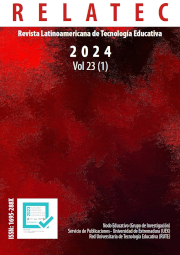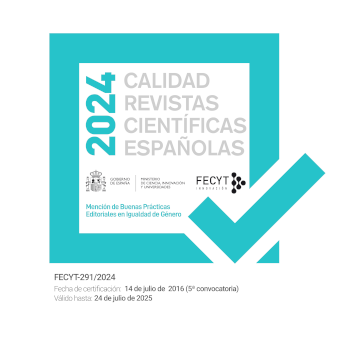Implicación de los estudiantes en el modelo Flipped Classroom aplicado en el aprendizaje en línea
DOI:
https://doi.org/10.17398/1695-288X.23.1.43Resumen
El compromiso de los estudiantes es un factor determinante en el éxito académico de los estudiantes, y es particularmente importante en el aprendizaje en línea. Este estudio tuvo como objetivo analizar el compromiso cognitivo, afectivo y conductual de los estudiantes en una propuesta pedagógica basada en el modelo Flipped Classroom, con estudiantes portugueses de secundaria. El estudio realizado durante la pandemia COVID-19 combinó clases asíncronas y síncronas divididas en episodios de aprendizaje (Resumen, Cuestionario y Salas). Utilizando métodos mixtos, se analizaron los discursos, los comportamientos, las percepciones de la experiencia y el rendimiento académico de los alumnos. Los resultados mostraron que la propuesta impulsó un alto nivel de compromiso conductual de los estudiantes expresado por los indicadores realización de tareas, interacción con los compañeros y participación. Los estudiantes mostraron mayores niveles de compromiso cognitivo en los episodios de las Salas porque propiciaban la interacción con los compañeros, la explicación de conocimientos y la reflexión facilitada por la interacción con el profesor. La satisfacción fue el indicador más destacado de la implicación afectiva de los alumnos. Este estudio contribuye a una mejor comprensión de los factores que influyen en la implicación de los estudiantes en el modelo Flipped Classroom, presentando implicaciones prácticas para mejorarla en el aprendizaje online.
Descargas
Referencias
Bardin, L. (2011). Análise de Conteúdo. Edições 70.
Bhagat, K. K., Chang, C.-N., & Chang, C.-Y. (2016). The impact of the flipped classroom on mathematics concept learning in high school. Educational Technology & Society, 19(3), 134-142.
Bishop, J., & Verleger, M. (2013). The flipped classroom: A survey of the research. [Conference session]. 2013 ASEE Annual Conference & Exposition, Atlanta, Georgia. https://doi.org/10.18260/1-2--22585
Bond, M. (2020). Facilitating student engagement through the flipped learning approach in K-12: A systematic review. Computers & Education, 151, 103819 https://doi.org/10.1016/j.compedu.2020.103819
Bond, M., & Bedenlier, S. (2019). Facilitating student engagement through educational technology: Towards a conceptual framework. Journal of Interactive Media in Education, 2019(1), 1–14. http://doi.org/10.5334/jime.528
Creswell, J.W., & Clark, V.L. P. (2013). Pesquisa de métodos mistos. Penso.
Eccles, J. (2016). Engagement: Where to next? Learning and Instruction, 43, 71–75. https://doi.org/10.1016/j.learninstruc.2016.02.003.
Fauzi, S. H. M., & Hussain, R. M. R. (2016). Designing instruction for active and reflective learners in the flipped classroom. Malaysian Journal of Learning and Instruction, 13(2), 147–173. https://doi.org/10.32890/mjli2016.13.2.6
Fredricks, J. A., Blumenfeld, P. C., & Paris, A. H. (2004). School engagement: Potential of the concept, state of the evidence. Review of Educational Research, 74(1), 59–109. https://doi.org/10.3102/00346543074001059.
Kahu, E. R. (2013). Framing student engagement in higher education. Studies in Higher Education, 38(5), 758–773. https://doi.org/10.1080/03075079.2011.598505
King, R. B. (2015). Sense of relatedness boosts engagement, achievement, and well-being: A latent growth model study. Contemporary Educational Psychology, 42, 26–38. https://doi.org/chqz
Kong, S. C. (2015). An experience of a three-year study on the development of critical thinking skills in flipped secondary classrooms with pedagogical and technological support. Computers & Education, 89, 16–31. https://doi.org/10.1016/j.compedu.2015.08.017.
Lai, H. M., Hsieh, P. J., Uden, L., &Yang, C.H. (2021). A multilevel investigation of factors influencing university students’ behavioral engagement in flipped classrooms. Computers & Education, 175, 104318 https://doi.org/10.1016/j.compedu.2021.104318.
Lo, C. K., & Hew, K. F. (2017). A critical review of flipped classroom challenges in K-12 education: Possible solutions and recommendations for future research. Research and Practice in Technology Enhanced Learning, 12(4), 1–22.
https://doi.org/10.1186/s41039-016-0044-2.
Lo, C. K., & Hew, K. F. (2021). Developing a flipped learning approach to support student engagement: A design-based research of secondary school mathematics teaching. Journal of Computer Assisted Learning, 37(1), 142–157. https://doi.org/10.1111/jcal.12474
Moore, M. G. (1989). Editorial: Three types of interaction. The American Journal of Distance Education, 3(2), 1–7. https://doi.org/10.1080/08923648909526659
O’Flaherty, J., Phillips, C., Karanicolas, S., Snelling, C., & Winning, T. (2015). Corrigendum to “the use of flipped classrooms in higher education: A scoping review. The Internet and Higher Education, 25, 85–95. https://doi.org/10.1016/j.iheduc.2015.05.001.
Olakanmi, E. E. (2017). The effects of a flipped classroom model of instruction on students’ performance and attitudes towards chemistry. Journal of Science Education and Technology, 26(1), 127–137. https://doi.org/10.1007/s10956-016-9657-x.
Pelikan, E. R., Lüftenegger, M., Holzer, J., Korlat, S., Spiel, C., & Schober, B. (2021). Learning during COVID-19: The role of self-regulated learning, motivation, and procrastination for perceived competence. Zeitschrift für Erziehungswissenschaft, 24(2), 393–418. https://doi.org/10.1007/s11618-021-01002-x
Pietarinen, J., Soini, T., & Pyhältö, K. (2014). Students’ emotional and cognitive engagement as the determinants of well-being and achievement in school. International Journal of Educational Research, 67, 40–51. https://doi.org/chq3
Riordan, T., Millard, D. E., & Schulz, J. B. (2016). How should we measure online learning activity? Research in Learning Technology, 24. https://doi.org/10.3402/rlt.v24.30088.
Ribeirinha, T., & Silva, B. (2021). The flipped classroom model potential in online learning: an assessment focused on pedagogical interactions. Publicaciones, 51(3), 295-345. https://doi.org/10.30827/publicaciones.v51i3.18076
Ribeirinha, T., Alves, R., & Silva Duarte, B. (2022). Análise comparativa do modelo Sala de Aula Invertida no contexto presencial e on-line. Revista Conhecimento Online, 2, 21–48. https://doi.org/10.25112/rco.v2.3004
Ruiz, R. D., (2021). Peirats Chacón, J., y Marín Suelves, D. (2020). Estrategias didácticas digitales: Encuentros entre la investigación y la práctica. Calambur. Revista Latinoamericana De Tecnología Educativa-RELATEC, 20(1), 103-104. https://relatec.unex.es/article/view/3975
Rumberger, R. W., & Rotermun, S. (2012). The relationship between engagement and high school dropout. In S. L. Christenson, A. L.
Reschly, & C. Wylie (Eds.), Handbook of research on student engagement (pp. 491–513). Springer.
Schindler, L. A., Burkholder, G. J., Morad, O. A., & Marsh, C. (2017). Computer-based technology and student engagement: A critical review of the literature. International Journal of Educational Technology in Higher Education, 14(1), 1-28. https://doi.org/10.1186/s41239-017-0063-0
Van Alten D.C.D., Phielix, C., Janssen, J., & Kester L. (2019). Effects of flipping the classroom on learning outcomes and satisfaction: A meta-analysis. Educational Research Review, 28, 100281, 1-18. https://doi.org/10.1016/j.edurev.2019.05.003
Xu, B., Chen, N. S., & Chen, G. (2020). Effects of teacher role on student engagement in WeChat-Based online discussion learning. Computers & Education, 157, 103956. https://doi.org/10.1016/j.compedu.2020.103956
Zhu, E. (2006). Interaction and cognitive engagement: An analysis of four asynchronous online discussions. Instructional Science, 34(6), 451-480. https://doi.org/10.1007/s11251-006-0004-0
Descargas
Publicado
Número
Sección
Licencia
Derechos de autor 2024 Teresa Ribeirinha, Bento Silva

Esta obra está bajo una licencia internacional Creative Commons Atribución-NoComercial-SinDerivadas 4.0.
Los autores/as que publiquen en esta revista aceptan las siguientes condiciones:
1. Los autores/as conservan los derechos de autor y ceden a la revista el derecho de la primera publicación, con el trabajo registrado con la licencia Creative Commons Reconocimiento-NoComercial-SinObraDerivada 4.0 International (CC BY-NC-ND), que permite a terceros utilizar lo publicado siempre que mencionen la autoría del trabajo y a la primera publicación en esta revista.
2. Los autores/as pueden realizar otros acuerdos contractuales independientes y adicionales para la distribución no exclusiva de la versión del artículo publicado en esta revista (p. ej., incluirlo en un repositorio institucional o publicarlo en un libro) siempre que indiquen claramente que el trabajo se publicó por primera vez en esta revista.
3. Se permite y recomienda a los autores/as a publicar su trabajo en Internet (por ejemplo en páginas institucionales o personales) antes y durante el proceso de revisión y publicación, ya que puede conducir a intercambios productivos y a una mayor y más rápida difusión del trabajo publicado (vea The Effect of Open Access).









